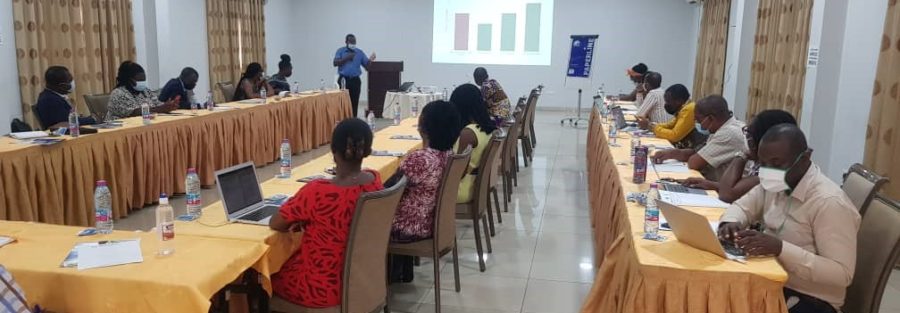Introduction
The Alliance for Reproductive Health Rights (ARHR), in partnership with the Ghana Health Service (GHS), have held a succession of stakeholders’ consultative meetings to disseminate the findings of an assessment conducted, with support from the World Health Organization (WHO).
The meetings brought together representatives from civil society organizations (CSOs), private organizations and health sector players from across the country to identify and discuss priority gaps in the study and how these lapses could be addressed effectively. In attendance were Dr. Cornelius Debpuur, Deputy Director, Research and Development Division, GHS and Dr. Edith Wellington, GHS.
The Study
In June 2021, GHS undertook a cross-sectional assessment of health facilities in Ghana to identify health system constraints impeding the timely deployment of essential COVID-19 tools. The assessments were designed to track and monitor health facilities’ readiness and case management capacity for COVID-19 and the continuity of essential health services in the context of the COVID-19 pandemic.
The assessment examined community needs, perceptions, demands, and barriers to seeking essential health services in communities. It also assessed the delivery of community-based services, attitudes towards the COVID -19 vaccine, and community vulnerability.
With countries facing major gaps and challenges in data systems, the study was also intended to help strengthen the country’s intelligence platforms and automated dashboards for real-time analysis and use of data for policy dialogue and action plan development.
Dr. Cornelius Debpuur, Deputy Director, Research and Development Division of GHS, in his opening remarks, noted that the assessment is the first of many undertaken by GHS. He further indicated that the findings of the assessment were based on the situation at the time of the study and may not reflect the current situation of most health facilities.
Presentation of the Study
In his presentation, Dr. Cornelius Debpuur discussed the objectives, methodology, and results of the assessment’s findings. Findings revealed major gaps in a wide range of services and areas. These included inadequate personal protective equipment (PPE) for staff, shortages in essential health clinical tools and COVID-19 treatment centers, unmet community health needs, shortage of COVID-19 diagnostics, inadequate medicines, oxygen, and ventilators, and COVID-19 vaccine hesitancy among community members. The survey also found that the psychological safety and mental support concerns of frontline workers were rarely addressed.
Together, stakeholders interrogated the assessment’s gaps and drew out specific courses of action for effective intervention as well as useful contributions for future assessments.
Recommendations
Participants suggested, among other things, a need for a private sector-CSOs collaboration on programs intervention; engaging local authorities to prioritise training and the procurement of diagnostics equipment; awareness creation of COVID-19 diagnosis gaps through radio and television campaigns; and providing free health services in the form of essential medical tools at healthcare facilities.
Participants also recommended the need for regional hospitals and clinics to own oxygen plants, and oxygen cylinders on site respectively. In addition, they advised that all facilities should have focal persons responsible for checking on the oxygen and reporting on them daily, with every hospital having at least a ventilator on site.
Regular in-service training on IPC and SOPS; quarterly integrated supportive supervision (ISS); the orientation of newly posted staff on competencies and skills training; organising quarterly refresher training support and intensifying social and behavior change and communication formed parts of participants’ recommendations.
Regarding inadequate PPE supplies, participants suggested the need for equitable distribution of PPEs; improved PPE distribution M&E systems; the establishment of a dedicated center for PPE donation; engaging in publicity and advocacy campaigns to raise awareness of the need for PPE supply for staff and sensitization of staff on responsible use of PPEs.
Participants further recommended a collaborative effort between GHS, the district assemblies, and the local council of churches in raising funds for PPEs for health facilities.
In the area of COVID-19 vaccination, participants proposed comprehensive education and advocacy activities on vaccines (including side effects) to improve COVID-19 vaccination uptake among community members.
Participants reiterated the need for strengthened effective coordination between CSOs, the private sector, and all actors in the health sector to improve the health service delivery capacity of facilities to be more prepared to address the health needs of Ghanaians.



